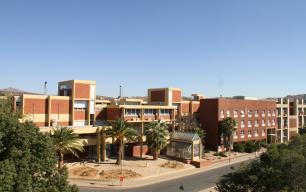Early childhood development and education interdependent

• By Fransiska Isaacks
Parents are the first contact person’s in a child’s life, and it is impera- tive that they understand the im- portance of their role in supporting the development of their children. They play a vital role in their learning experience and education. Early education often involves parents in their child’s learning journey. This partnership between educators and parents strengthens the child’s support system and creates a holistic approach to development.
[Moreover] it is our responsibility as educators, parents, and the entire Namibian government to lay a strong developmental and educational foundation for the Namibian child. The present educational reform acknowledges that early childhood education is essential to children’s entire development and academic achievement (IECD Policy 2007). Both Early Childhood Development
(ECD) and Early Childhood Education (ECE) are crucial and closely linked in a child’s life. However, they focus on different aspects of a child’s growth and learning. Firstly, it is important to understand the terminology and then their respective roles.
Early childhood development is the stage of development that occurs between conception and the age of eight, during which a child’s abilities progress from simple to sophisticated. A child’s growth and development are at their peak throughout these stages. The risks a child faces during this time, whether psychological or environmental, can significantly impact their growth and
future. Nations with higher levels of healthy and educated adults are built on the foundation of early childhood development.
Any setting where young children are exposed to learning can be referred to as early childhood education. Early childhood education is a fundamental human right, and every Namibian child should have access to it. It consists of activities and/or experiences intended to effect developmental changes in children before they enter primary school. In short, early childhood education sets the stage for a child’s lifelong learning journey. It nurtures intellectual, social, emotional, and physical development, providing a strong foundation for success in school, and its impact extends far beyond the classroom. Development is a slow and ongoing process, and each child develops at a different rate. However, Early Childhood Development has a significant impact
on a child’s prospects for overall success.
Below are several reasons for its importance:
1. Brain Development
• Rapid Growth: The first few years of life are a time of rapid brain development, which lays the groundwork for later learning, behavior, and health.
• Neural Connections: Early life events influence the development of neural pathways, which in turn affects emotional and cognitive
growth.
2. Emotional and Social Competencies
• Foundation for Connections: Children learn how to build connections and develop trust through their early encounters
with caregivers.
• Emotional Regulation: ECD promotes emotional intelligence, which is necessary for social in-
teractions.
3. Cognitive Development
• Language Acquisition: Proficient vocabulary and communication abilities are greatly improved by early language exposure.
• Critical Thinking: Tasks that encourage creativity and problem-solving develop the mental abilities necessary for success in the classroom.
4. Physical Development
• Motor Abilities: Through play and discovery, young children acquire both fine and gross motor abilities at a crucial period.
• Health: Early physical activity and a healthy diet foster general health and wellbeing. Early childhood education is essential for preparing children for formal schooling, improving their chances of academic achievement. The importance of early childhood education is discussed below:
1. Early childhood education can greatly enhance learning and development in children.
High-quality early childhood education benefits a large number of at-risk children by preventing negative outcomes like dropping
out of school.
2. Although the benefits appear to cross all social and economic boundaries, children from low-income families who have never attended formal schooling almost invariably experience the largest improvements.
3. It is arguable, though, whether these benefits endure over time.
4. However, research indicates that early childhood education (ECE) improves academic achievement over the long run and reduces the number of students who are placed in special education pro- grams or held back a grade.
5. Other long-term benefits include decreased rates of crime and delinquency and increased rates of high school graduation.
6. Early education (especially in kindergartens) exposes children to their peers, which helps them learn about inclusivity, diversity,
and empathy for other children’s cultures, backgrounds, and abilities. This promotes tolerance and acceptance from an early age.
In summary, early childhood development and early childhood education are interdependent, with effective ECE building upon the foundations established through ECD. Together, they play a crucial role in shaping a child’s future potential. Investing in both ECD and ECE not only benefits individual children but also contributes to healthier communities and stronger economies. It is a vital foundation for lifelong learning and well-being. Let us provide a safe haven for our children during their development and education.
*Fransiska Isaacks is a Third Year Student at the International University of
Management pursuing a Bachelor of Education Honours in Pre/Junior Primary.
Her goal in life is to see every Namibian child receive a top-notch education in a setting where they can naturally find their true passion and improve the world. She is writing in her own capacity
- 197 views










Comments